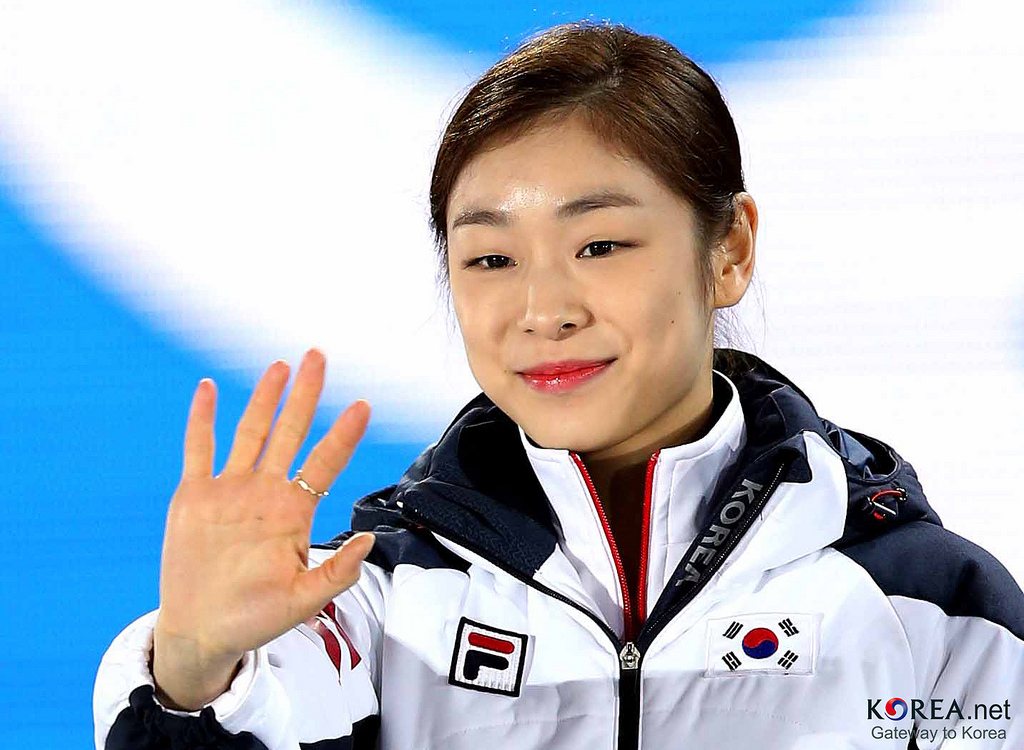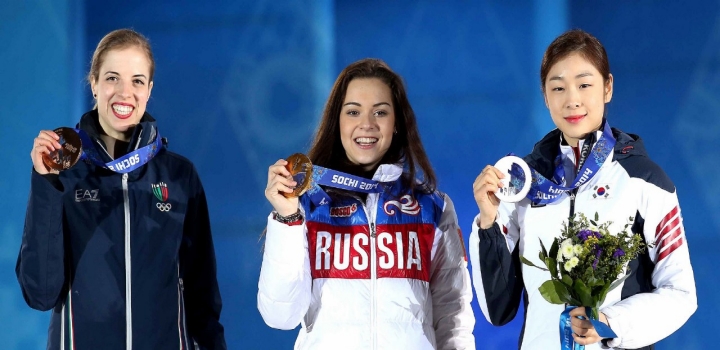On the occasion of the visit of the Holy Father Francis to South Korea (13-18 August 2014), the Osservatore Romano published Cristian Martini Grimaldi’s interview of Yuna Kim, Olympic ice-skater converted to Catholicism in 2008.
Yuna was born in 1990 in Bucheon. She started skating at age seven after having learned from her mother. She was a gold medal winner at the Vancouver 2010 Winter Olympics and silver medal winner at the Winter Olympics in Sochi 2014, as well as world champion in 2009 and 2013. In 2008, she was baptized as a Catholic alongside her mother, taking the name of Stella.
Like caresses in the wind
Robert Thaves, an American cartoonist, once said of Fred Astaire: “he is indeed very talented, but don’t forget that Ginger Rogers did everything that he did but in reverse and on stiletto heels”. The same might be said of figure skating champions with all their acrobatics, pirouettes and turns performed on a vast carpet of ice, clad in stiff boots and striving to keep perfect balance on thin steel blades. Yuna Kim, the 23-year-old South Korean young woman who is a figure skating champion of South Korea, was world champion in 2009 and in 2013, winning a gold medal at the Winter Olympics in Vancouver in 2010. She came second in the recent Olympics at Sochi. Figure skating is one the rare sports in which the skater is not judged solely for speed or technical prowess. And Yuna Kim is the Ginger Rogers of this sport. Her choreographies seem caresses in the wind.
Yuna also accepts defeat elegantly: everyone expected of her declarations, if not a furious outburst – or at least incredulity – when the Olympic medal at Sochi went to Russia’s idol, Adelina Sotnikova, through a disputable verdict of the judges. But she gave no sign of them. “I did my best”, she said when we met her in the sports studio she runs in the heart of the Gangnam district, “and I don’t blame anyone. The classification I received was what I deserved”.
The modesty and sobriety with which this Korean young woman confronts events is redolent of ancient Oriental practices. Yet Yuna is a Catholic.
But let’s start at the beginning. When did you put on skates for the first time?
I was five years old and for 17 years my mother kept me going in my training, wherever I went. Without her presence and support I should have never have achieved what I have. This is also because a good teacher costs a lot and the expenses of staying abroad must be covered. I started to skate with my sister for fun, I was five and it was the teacher I had then who told my mother that I had a good potential. However, to develop this potential I had to devote at least seven hours a day to this sport; in that period I didn’t even manage to go to my lessons at school and the only friends I had were my skating companions.
When was your faith born?
I had an injury, indeed a series of injuries, starting in 2006, which obliged me to be in and out of hospital. In hospital I had a providential encounter with some Catholic doctors with whom I established a trusting relationship. They quoted sentences to me from the Bible and the New Testament, to keep up my morale and to comfort me, and all this was a great help in overcoming the psychological problems I had due to my continuous relapses after my injury.
What did you find striking in these doctors’ words?
I would say that what impressed me most was that they were not trying to convert me. Theirs was a disinterested act for a girl who was going through a difficult time in her life and in her professional career; they sought to give me the best possible advice in accordance with their vision of the world. Gradually, won over by their approach and their words of comfort, I started to reflect on the faith. It was 2008. I was 18 years old.
How did things go?
It was the hardest time in my life and also for my mother, who had made so many efforts for me and for my success, and I was in a critical situation in which there seemed to be no light at the end of the tunnel. My back problems had been recurring for two years, it seemed as though I would have them forever. At a certain point you find yourself at a crossroads. You ask yourself if it is really worth going ahead and, if it is, where you can find the strength to continue to hope. I needed to be able to count on something or someone. Faith in Catholicism gave me all this. For me it was a completely unknown path. Neither my mother nor my father was a believer. But in hospital I met Fr Lee. He was not merely the clinic’s priest but he himself was also a patient at that time and a common destiny seemed to create a certain bond between us. After meeting Fr Lee I began to understand more in detail the fundamental teachings of Catholicism; he gave me private lessons on the Bible and on the Gospels, in short he introduced me to the faith: hence my decision to be baptized with my mother. That was 24 May, six years ago.
Can possessing a deep faith also, involuntarily, become an advantage for attaining success in a sport?
I can’t speak for others. With regard to my own situation it was a great help to me in dealing with my injuries but it also gave me the mental ability to face pressure from the media and from critics. Today, thanks to taking this path of faith, I am better able to accept a failure.
Do you pray before every competition?
I pray every time, before every competition and during it. It is a way of showing God my gratitude for everything that life has given me. Today more than previously, I appreciate the value of a good physical condition, because I know that it may only be temporary, and the same thing happens in failures: the world doesn’t come to an end if you don’t win a competition, there’s a remedy for everything. Then if you never seem to find the remedy, well, that’s just God’s will; but you should never give up hope.
At the London Olympics the fencer Shin A-lam – also Korean – lost in the semi-final: as a protest against the judge’s decision she refused to come down from the platform. She had to be carried out by the general secretary of the International Fencing Federation. Have you ever reacted like that to a defeat?
No, never. But everyone reacts to defeats in a very personal way. I do not feel like judging anyone.

You always wear a ring in the shape of a rosary. Does it give you a sense of security?
Yes, I remember that God is with me at every moment and this gives me great strength.
The Pope is about to arrive in Korea and it is likely that you’ll be able to meet him. Is there any question you’d like to ask him?
It is very important for an athlete to keep in excellent psychological and physical form. I’d like to ask the Pope whether he believes that a believer should also keep in good shape, psychologically and physically.
If you were to describe Korea to Pope Francis what would you tell him?
I think I would talk to him about our word jeong. It has a meaning generally very broad, it signifies human affection, a connection between people. It becomes essentially obvious in special circumstances. For example we saw it after the accident of the Sewol ferry which caused the death of a large number of young students. During particularly tragic events but also, on the contrary, in the most joyful events, Koreans are inclined to show solidarity in the sentiment of suffering and bereavement and indeed of joy. In short it is a very effective way of living out suffering that doesn’t stay locked up in each person’s individual awareness but, rather, is shared with everyone. Another instance in which jeong was particularly visible was during the economic crisis of 1997, when three and a half million Koreans donated hundreds of tons of gold to the country in order to halt the crisis. I think that the first time an individual is exposed to the experience of jeong is when a child is carried in his mother’s arms. Then, little by little, as that experience of jeong increases it will be extended to include all the other basic relationships, with the father, with the brothers and sisters and with the members of the community.
Koreans often say that life in the West is lacking in “jeong”.
Koreans are certainly able to face life’s difficult moments together. And this may be something that is lacking in the West which is traditionally more individualistic.
Are you happy when you’re skating?
It’s my job, I can’t say whether I am happy or not. However, when I was little I certainly had more fun (she laughs). Today my amusement is to teach all that I’ve learned to the new generations.
As well as being elegant, Kim Yuna is very modest: in fact she does far more than teach skating to the young. Already in 2007 she had begun her philanthropic activity, donating millions of dollars for the victims of Typhoon Haiyan (Yolanda) in the Philippines and for those of the tsunami in Japan in 2011, and to support the survivors and families of the victims of the Sewol ferry tragedy. However, perhaps remembering the Gospel saying: “do not sound the trumpet when you give alms”, she preferred to keep quiet about it. And this, in a world of VIPs who do nothing other than publicize themselves wildly to get a wretched handful of extra retweets, does her great honour.
Photo by Chung Sung-Jun / South Korean Olympic Committee


